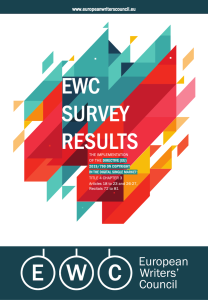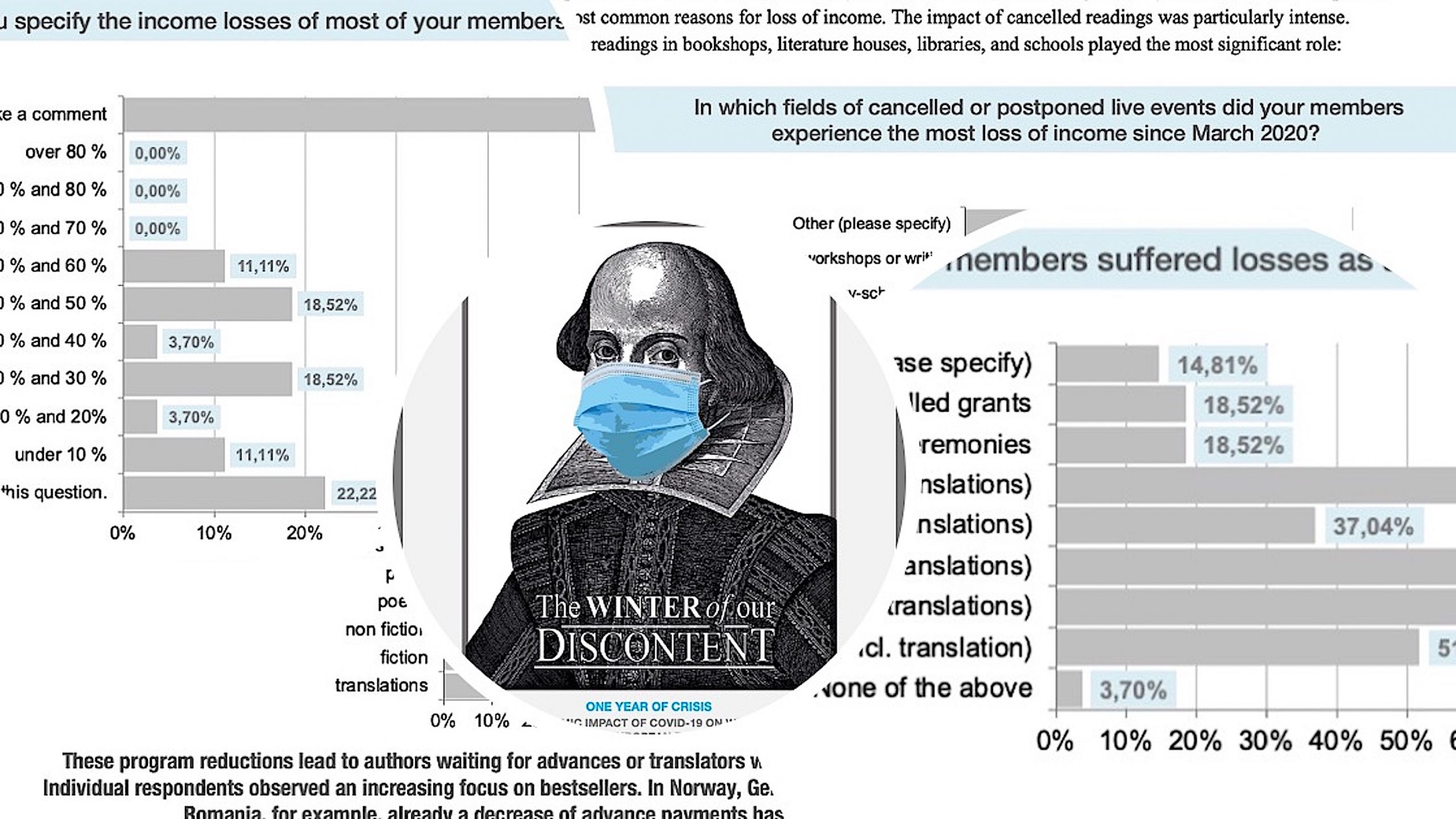The European Writers’ Council publishes its follow-up survey on The Economic Impact of the Covid-19 on Writers and Translators in the European Book Sector 2020-2022
Brussels, 2 November 2021
Already in 2020, the European Writers’ Council study The Economic Impact of Covid-19 on Writers and Translators in the European Book Sector surveyed 33 professional organisations from 27 countries for a comprehensive report on the situation for book authors under the Covid-19 crisis. The follow-up study One Year of Crisis – The Winter of our Discontent, outlines the status quo regarding loss of income in 2020 and 2021, legal gaps and social welfare problems, and charts impacts for 2022-2025. The foreword was contributed by CULT member MEP Niklas Nienaß.
The paper concludes with ten recommendations related to the 37 recommendations already made to national and European decision-makers, and a position paper.
A brief summary

Based on the data in 2020, we expected the deep rupture that will cut through the book landscape of the post-crisis years – and the forecasts have been confirmed, including the reduction of new publications in Europe by almost a third (-150,000 titles), and thus an unprecedented radical reduction in literary diversity. Making matters worse for writers and translators, of course, was the income loss of cancelled live events in 2020 and 2021 – from readings to lectures, workshops to residency scholarships, in addition to delayed or completely cancelled royalties or advances because of postponed titles.
In addition, the lack of support for self-employed authors was particularly worrying: only one in two of the 20 countries with state support was able to compensate for the involuntary 30% to 60% income loss of the mostly self-employed full-time authors. This is where solidarity among authors’ organisations for member aid has had to step in.
The digital world was also only partly a way out: the growing desire for e-books and audio books did not compensate for the drop in print sales. Readings or online performances were rarely paid for: there is no concept in the digital world so far to also encourage audiences to pay admission to “virtual gigs”.
Overall, the crisis has shown that writers and translators have hardly been able to build up reserves due to the contractual conditions that are often disadvantageous for them and the value-added gap when their work is used online or in educational institutions and digital libraries. It is even more depressing that the DSM Directive on copyright in the Digital Single Market, which is so important, has been delayed in most EU countries. Accordingly, half of all respondents assess the situation as very severe to severe.
School and teaching materials were widely queried for remote learning. This led to CMOs extending licences and often making them available free of charge – a loss that educational writers carried. In the context of calls for more exceptions and limitation, this seems to us to be a particularly burning issue for the future: Education needs budgets, and the legal protection, not the weakening, of the sources of knowledge, education, and literature.
However, a certain democratisation of literature was also positively noted: authors who were previously dependent on whether and where they were invited to present their books used the online opportunity to initiatively reach readers across all borders, or to develop new formats of conversation, workshop, and literary-political conferences. Also, the crisis has encouraged some publishers to go much broader in e-book publishing – and booksellers to partner locally with small businesses to deliver books to people in lockdown.
The key findings of the 38-page survey One Year of Crisis: The Winter of Our Discontent

- 77% of all authors suffered from cancelled live events; cancellation fees
were not paid in 90% of cases. - 15% to 25% average income loss for part-time, 30% to 40% for full-time
writers and translators were registered. - 52% of the respondents estimate the overall impact to be from severe to very severe.
- Only half of all 20 monitored countries offered state compensation or aid packages.
- Publishers postponed titles for 8 to 18 months or cancelled them. For 2021/2022, the respondents foresee a reduction of 30%. This leads to 150,000 fewer titles in the European sector per year, and a “title traffic jam”. Royalty advances went down.
- The usage of educational book and text materials for schools, universities, etc. for remote learning has increased, but with license extensions or fee relief. 70% of all Collecting Managements Organisations (CMOs) are expecting a negative long-term impact on the collective licensing income for authors.
- A positive message: Online readings, book launches, digital lectures and workshops, and virtual conferences were identified as the positive gains, together with a rise of audio book and e-book distribution.
A selection of the EWC recommendations
- Strong implementation of the EU Directive on Copyright in the DSM.
- Improving Public Lending Right, protecting equipment levies, increasing the budget for education and culture.
- Establishing protective legal frameworks for online and offline authors’ activities.
- EU wide harmonisation of the authors’ working conditions and social security.
- A fair playing field in the digital distribution markets.
The European Writers’ Council, representing 160,000 professional writers and translators from 46 organisations and 31 countries, calls on the Members of the European Parliament, the EU Member States, and the Governments of Non-EU and the EAA countries, to act speedily and protectively for authors, who are the sources of the book value chain, literature, and knowledge. This also in view of challenges such as TDM and AI in the book sector, the implementation of the European Accessibility Act, and the exploitation of authors’ works within libraries or educational institutions.
We now need a shared consensus to decisively strengthen authors and their moral, economic, and social rights, and not to weaken them further.
To the EWC Position Paper.
Downloads
Related links
Press release and download center

